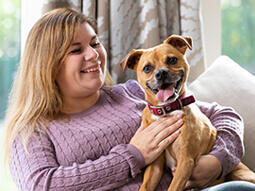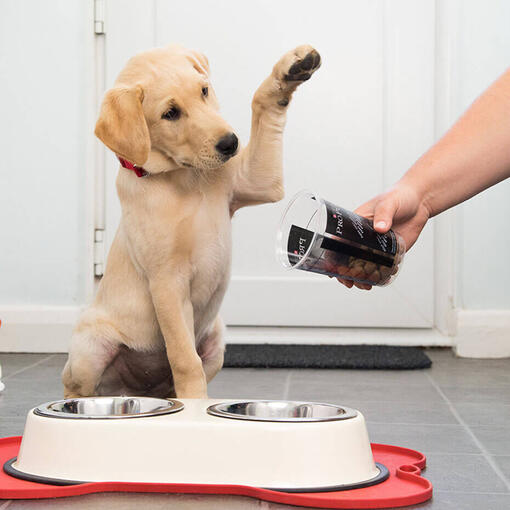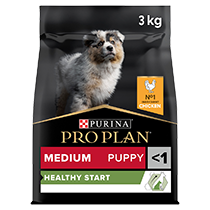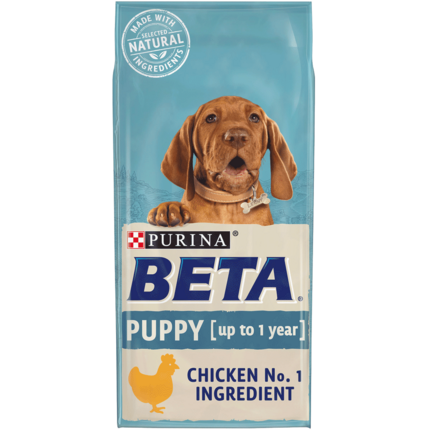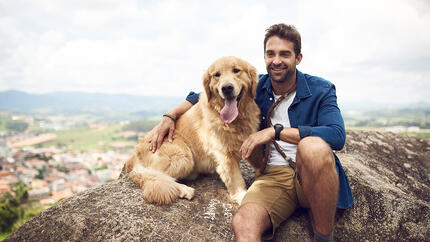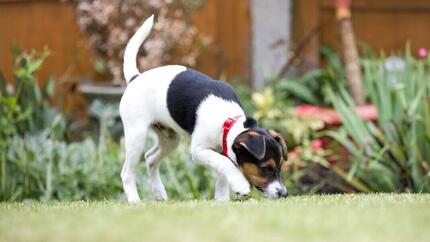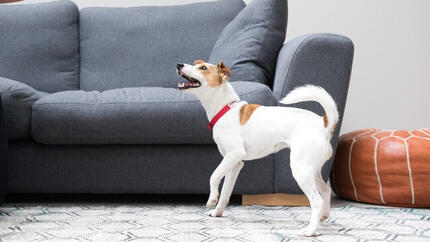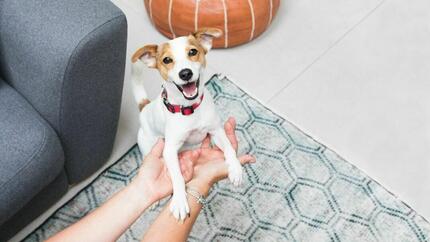

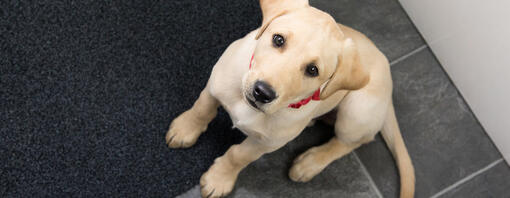
Teach Your Puppy to Stop Begging
We know that resisting those big puppy eyes is difficult but discouraging begging behaviour can help keep your puppy healthy (thanks to fewer sneaky table scraps!) and prevent puppy begging from becoming more insistent or demanding as your puppy grows up!
Puppy begging can be anything from giving you those cute appealing eyes, to whining, scratching your leg, jumping up and even barking at you. If your dog behaves like this every time, you sit down to have a meal, you can be sure your puppy has learnt how to beg for food or a delicious treat!
Dogs are brilliant at devising new and interesting ways to get what they want from their owners at mealtimes – in this case, a sneaky delicious treat. However, this can be difficult for you as an owner, especially if it happens every time you want to eat if the begging becomes more demanding - and especially if you have children or vulnerable adults, or guests who don’t appreciate your dog wanting to share their meal.
While you might not mind your dog begging, if they think that your mealtimes are an opportunity to get tasty treats, this could easily become problematic if they do this with others.
Fortunately, dog begging for food can be prevented using a few simple steps.
Why do dogs and puppies beg for food
Dogs beg because it works. Playing on your caring nature, they use their best acting skills and begin the hope of being treated to scraps from the plate. Dogs perfect this method of asking for food because it is so effective, and our dogs evolved as highly effective scavengers.
This clever but totally natural canine behaviour means that your dog can often persuade you to give them more food without exerting much effort.
It is hard to resist a cute puppy who is trying to convince you that they really need just a small mouthful of your delicious food! Nearly always at some time during your puppy’s early weeks with you someone will give them something from the table - and so very early on your puppy realises that begging is worth doing because sometimes, it works! And you - or whoever gave into those beseeching puppy eyes - have taught them that.
As a puppy grows up, they are learning all the time what works and what doesn’t in this strange new life. The things that are ‘rewarded’ will be repeated - and all so often people reward this begging behaviour.
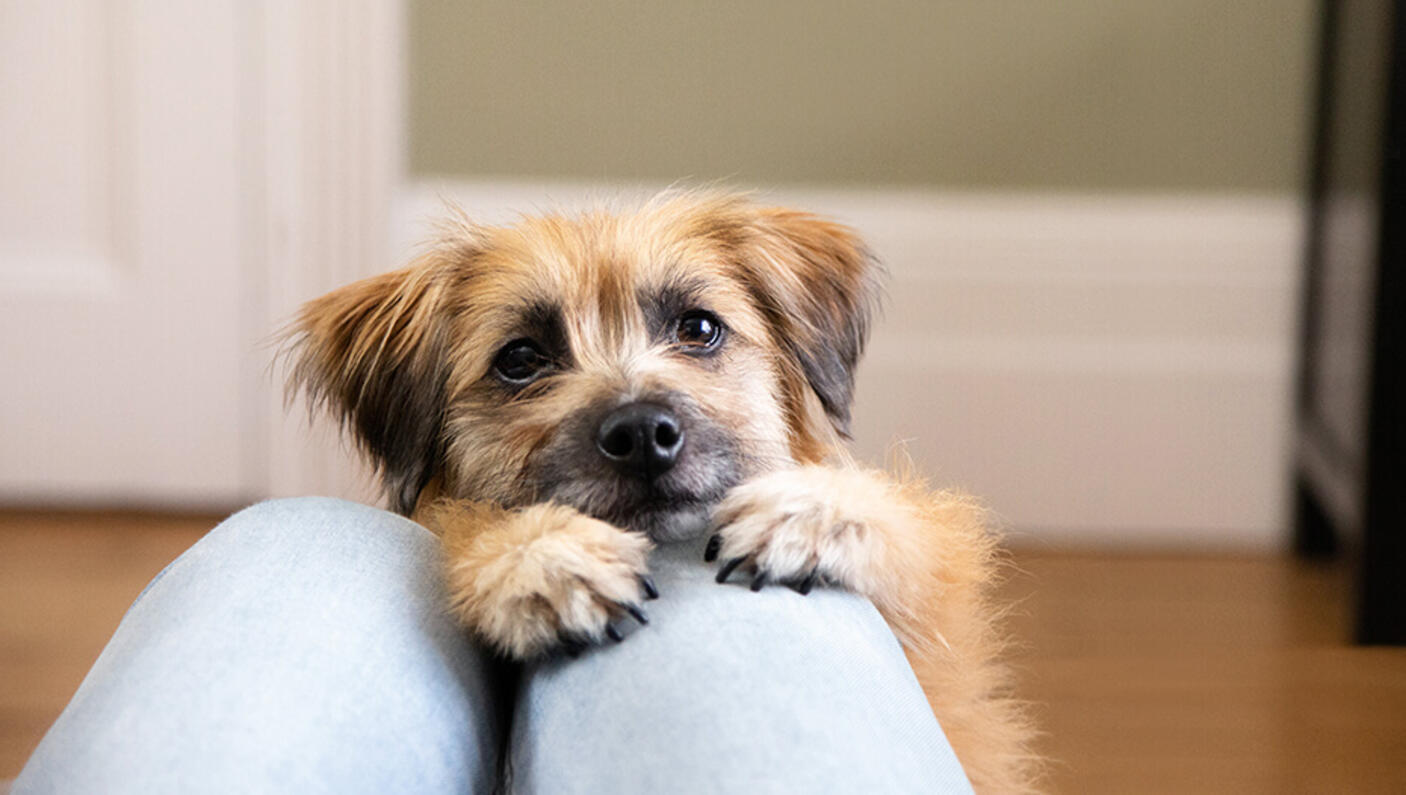
How to stop your puppy begging
Every time a dog does a behaviour, they will become better at it - and begging is definitely one of those behaviours that gets more skilled.
By far the best way to stop begging - or better still, prevent it from happening in the first place - is to not give your puppy access to you or your family when you are eating.
Use a baby/stair gate in the doorway of the room you eat in and have your dog on the other side - or else temporarily put your puppy in a crate or pen in the same room but away from where you are having your food.
Give them something nice of their own to chew on while you are having your meal (such as a stuffed Kong toy) so they have something enjoyable to think about rather than how they are missing out on a yummy treat from you.
Ignore them if they whine, bark or give you the puppy eyes.
Very quickly they will learn that they don’t have access to human meal times or get food from the table - and you can be sure no one is sneaking them treats under the table when you are not looking!
If you really want to give your dog something from the table, wait until you have finished, put it in their bowl, and give it to them in their usual feeding place.
We love our dogs and for many people, giving their dog a tiny treat from their meals is rewarding for them and a part of the relationship they want with their dog. If this is you, make sure these are tiny treats, that they are appropriate and healthy for dogs, and that you feed them away from the table if you don’t want a dog who constantly begs!
When your puppy is begging, don’t give them attention
If you don’t want your dog to beg, remember that your dog is well-cared for and well-fed - so doesn’t need extras. Feeling sorry for your dog will mean you’re more likely to give in and so encourage begging to continue - and get even more inventive. Remember, if you give in to your puppy begging, it will teach your them that begging yields rewards, and so this behaviour will continue into adulthood. Begging in a large, slobbery, insistent adult dog isn’t anywhere near as cute as in a puppy!
Be consistent.
For any kind of dog training to work, it has to be consistent. This is no different with dog begging. If you (and everyone in the family!) consistently adhere to the tips above, and give your dog no opportunity to get a treat from the table, this behaviour will stop. If you have a begging puppy, this is even more important, since the training they receive in their early life will shape their behaviour more strongly as they grow up with no expectation that begging will work.
Don’t punish your puppy’s begging habits
Even though a puppy begging might be difficult to ignore, punishing your dog for showing a totally natural behaviour that you (or someone in your family) has encouraged is totally unfair and will damage the bond between you. Your goal is to prevent the behaviour (using gates, crate, play pen etc), give an alternative reward (their own toy/treat) and never reward the begging.
When your puppy is begging, patience is key
Since dog begging is learned, your dog’s behaviour won’t change instantly as you have taught them that it works! Unlearning something that has previously been successful takes time. All dogs are different, and some are way more perseverative, so this will vary from pet to pet but if you really want to stop your dog begging, be prepared to commit long-term, be consistent and you will soon start to see results.
Set a feeding routine
If your dog knows exactly when and where they will be fed every day, they are far more likely to be relaxed around food - although a tasty treat is often still too good to ignore!
Begging is a very common occurrence and given the chance, virtually every dog will do it - and it’s very easy to encourage that behaviour. Just one slip up and your dog will continue to believe that begging is worth it - because sometimes it works! Luckily, if you commit to removing begging from your household by teaching your dog over the long term that it’s not going to work - ever - then you should see success.
How to stop your puppy begging for food
We have all sat down to enjoy a meal and felt the burning stares of our puppies by our sides. It can be tempting to give them some food, but this not only reinforces puppy begging, but it can also lead to tummy upset if they are fed something they shouldn’t have.
There are ways to combat puppies begging for food and here are a few tips on how to avoid the stares at the dinner table.
Feed your puppy before you eat dinner
This may seem like a simple option, but it is really effective to stop puppy begging. Feed your puppy in a separate room just before you sit down to have your meal, making your dog eat in a room separate to where you would eat your meal, is also an effective way to stop puppy begging. Your puppy will be too busy enjoying their meal, to worry too much about what you are getting up to.
Give them an alternative
If it’s not puppy meal time, use something like a chew, a stuffed Kong or a food dispensing toy to give them something they can enjoy that isn’t your food!
Don’t pay them attention
When your puppy is begging for food at your feet, it is best to not acknowledge their behaviour. Carry on with your meal and only show them attention once everyone has finished eating and the plates have been cleared.
Always try to offer a puppy an alternative activity when you are eating to keep them occupied and to minimise puppy begging.
Next, find out more about setting up your puppy with healthy eating habits that will last a lifetime, without a puppy feeding guide.
